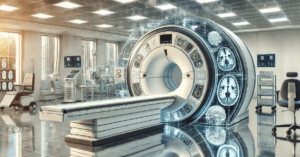AIIMS and SAMEER Join Forces to Revolutionize India’s Healthcare with Groundbreaking MRI Technology
AIIMS New Delhi and SAMEER have signed a groundbreaking MoU to advance medical electronics and healthcare technology in India, focusing on MRI, NMR, and RF/Microwave technologies. The collaboration covers key areas such as medical device research, clinical validation of SAMEER’s indigenous 1.5 T MRI system, and AI/ML research to enhance imaging. Additionally, it aims to develop subsystems for high/low field MRI scanners and create RF subsystems for high-field animal MRI scanners.
A key component of the initiative is the Indigenous Magnetic Resonance Imaging (IMRI) project, a national mission to develop India’s own 1.5 Tesla MRI system, led by SAMEER alongside organizations like C-DAC and IUAC. The 1.5 Tesla magnet has already been developed, and ongoing testing will support India’s goal of self-reliance in MRI technology. The MoU will facilitate clinical validation, and key figures from MeitY, AIIMS, and SAMEER are backing this effort to strengthen India’s medical device ecosystem.

AIIMS and SAMEER Join Forces to Revolutionize India’s Healthcare with Groundbreaking MRI Technology
In a major step toward advancing India’s healthcare sector, AIIMS New Delhi and SAMEER (Society for Applied Microwave Electronics Engineering and Research) have entered a partnership through a Memorandum of Understanding (MoU). This collaboration aims to drive innovation in medical electronics, particularly in areas like MRI technology, nuclear magnetic resonance (NMR), and radiofrequency (RF) systems. The goal is to develop cutting-edge, affordable healthcare solutions tailored to India’s needs while reducing reliance on imported medical devices.
Key Focus Areas of the Collaboration
The MoU, signed during the 32nd Foundation Day celebrations of AIIMS’ Department of NMR, outlines five primary objectives:
- Joint Research on Medical Devices: Combining AIIMS’ clinical expertise with SAMEER’s technical prowess to design and develop advanced medical equipment.
- Testing India’s First 1.5 Tesla MRI System: Clinically validating a homegrown MRI machine developed by SAMEER in Mumbai. This step is critical to ensure the system meets safety and performance standards for human use.
- AI/ML in Medical Imaging: Leveraging artificial intelligence and machine learning to improve image quality, reduce scan times, and enhance diagnostic accuracy.
- Building MRI Subsystems: Designing components for both high- and low-field MRI scanners to boost versatility and affordability.
- RF Technology for Animal Scanners: Developing specialized RF systems for preclinical research using high-field MRI scanners on animals.
The Indigenous MRI Project: A National Mission
At the heart of this partnership is the Indigenous Magnetic Resonance Imaging (IMRI) initiative, a flagship project to create India’s first fully domestically developed 1.5 Tesla MRI system. Spearheaded by SAMEER, along with institutions like C-DAC (Centre for Development of Advanced Computing) and IUAC (Inter-University Accelerator Centre), the project has already achieved significant milestones. Key components, including the 1.5 Tesla magnet—the core of the MRI machine—have been designed and tested. Successful animal trials and subsystem evaluations (such as gradient coils and RF amplifiers) mark progress toward finalizing the prototype.
The collaboration with AIIMS will enable crucial clinical trials on human patients, a vital step before the technology can be widely adopted. Once validated, this breakthrough could position India as a self-reliant player in MRI manufacturing, aligning with the nation’s vision of Atmanirbhar Bharat (Self-Reliant India).
Leaders Highlight Collaboration and Innovation
Dr. M. Srinivas, Director of AIIMS New Delhi, stressed the importance of bridging the gap between medical professionals and engineers. “When clinicians and technologists work together, we can create devices that are not only innovative but also practical and patient-centric,” he remarked.
Sunita Verma, a senior official from MeitY (Ministry of Electronics and Information Technology), echoed this sentiment, emphasizing the need for “co-creation” to address India’s unique healthcare challenges. “Our focus is on developing solutions that are cost-effective, scalable, and globally competitive,” she said, highlighting the potential for Indian-made devices to serve both domestic and international markets.
A Step Toward a Stronger Healthcare Ecosystem
The MoU signing event saw participation from representatives of MeitY, AIIMS, and SAMEER, all underscoring the initiative’s role in strengthening India’s medical technology landscape. By fostering partnerships between research institutions and hospitals, the project aims to accelerate the translation of lab innovations into real-world healthcare tools.
This collaboration isn’t just about technology—it’s about transforming patient care. Affordable MRI systems could make advanced diagnostics accessible to smaller towns and rural areas, addressing gaps in healthcare infrastructure. Moreover, integrating AI into imaging could reduce costs and waiting times, benefiting millions.
Looking Ahead
The AIIMS-SAMEER partnership represents a paradigm shift in India’s approach to medical technology. Rather than depending on expensive imports, the focus is now on homegrown R&D and collaboration. The success of the 1.5 Tesla MRI project could pave the way for other indigenously developed devices, from ultrasound machines to robotic surgery systems.
As India battles rising healthcare demands, initiatives like these offer hope for a future where cutting-edge medical care is both accessible and affordable. With continued support from the government, academia, and industry, the country is poised to become a global hub for innovative healthcare solutions.
In essence, this MoU isn’t just a document—it’s a promise of progress, self-reliance, and better health for all.
You must be logged in to post a comment.